Toasting Herzog
Time‘s Richard Corliss and Richard Schickel are both smart and crafty film critics, but I’ve never regarded them as providers of radiant cinematic wisdom…until today.
They’ve both chosen a Werner Herzog documentary as their favorite film of ’05 — Corliss going for The White Diamond and Schickel for Grizzly Man — and the passion behind these choices seems especially right and gives me a sublime pre-holiday feeling.
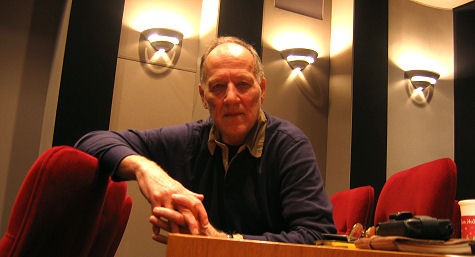
Werner Herzog during chat at L.A.’s Director’s Guild theatre — Friday, 12.16.05, 12:25 pm
In part because I had an especially good conversation with Herzog eight days ago in Los Angeles (on Friday, 12.16), a recording of which can be sampled here, and because I’ve been reflecting on it since.
And in part because a Herzog film is always good for the soul, and because we all need to remind ourselves on a periodic basis what a particular treasure and benefit his films are in so many transcendent ways…and what an exceptional, world-class visionary this Los Angeles-based filmmaker truly is.
< ?php include ('/home/hollyw9/public_html/wired'); ?>
Grizzly Man will be out on DVD on 12.26 via Lion’s Gate, and The White Diamond is now out on DVD via Wellspring.
If anyone is just starting to get into Herzog, a good place to begin is the aston- ishing Burden of Dreams, the 1982 Les Blank documentary about the making of Herzog’s Fitzcarraldo, which came out on a Criterion DVD earlier this year.
There is no filmmaker I know of who cares more about getting viewers to trust their eyes (which almost no one does anymore, he says, quite accurately, since special effects began to dictate visual terms to action-adventure film starting about 25 years ago) or, much more importantly, their dreams.
There may be filmmakers out there who are more earnestly committed to a particular vision of things or more determined to express cinematic worship about all things natural, eternal and transcendent than Herzog, but I would like to know who they are.
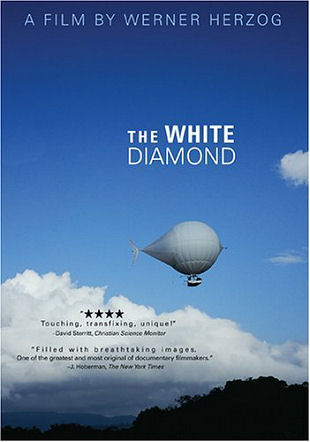
I wrote last summer that Herzog’s films “should not be rented — they should be owned and pulled out every few months and not just watched in a social way with friends but seriously absorbed in a state of aloneness…like meditation, with incense burning.”
Keep in mind that Herzog has a live-action feature called Rescue Dawn, a non-Vietnam War jungle survivalist drama set in Laos in 1965, coming out in March ’06 (according to the IMDB).
The indie-financed film is partly inspired, suggested or at the very least echoed or hinted at by Herzog’s 1997 doc Little Dieter Needs to Fly, the film costars Christian Bale, Steve Zahn and Jeremy Davies.
The White Diamond is about Herzog going back to the South American jungle, like he did in Aguirre, the Wrath of God some 33 years ago with his “best fiend” Klaus Kinski, and again for Fitzcarraldo.
The place this time is the rain forest in Guyana, in northeastern South America, and the risky activity (which there usually is in a Herzog doc) is flying in a helium airship above the treetops with a British engineer named Graham Dorrington.
The movie is about Herzog wanting to capture whatever he can in this hallowed environment, especially as it relates to the purity of the non-technological, anti- intellectual lives and customs of the natives as well as the wonder of the rain forest itself.
It’s also about Dorrington wanting to somehow to work through and maybe exor- cise the guilt he feels about the death of a friend named Dieter Plage, a German cameraman who met his demise after falling out of a similar Dorrington-made helium airship in Sumatra in 1993.
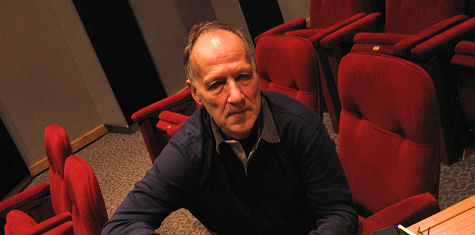
Friday, 12.16.05, 12:27 pm
Neither vein proves entirely cathartic, but I didn’t care because the movie still puts me into a mystically spooky, deeply beautiful jungle environment with Herzog trying to touch and uncover wondrous things, and sometimes deliberately not uncovering them.
The spiritual epicenter of The White Diamond is the glorious footage of Kaieteur Falls with its urine-colored water plunging over the crest and creating magnificent mist clouds below…all mighty and roaring and wonderful for simply staring at for hours.
Below and behind the falls is a vast cave where thousands of swifts — white-breas- ted birds with broad wing-spans — mate and nest and hang. There’s a stunning sequence when one of Herzog’s guys is lowered down to a position where he can shoot into the swift cave.
Herzog is later told by the locals that including this footage in the film will some- how intrude upon the spirit of the falls and violate its other-ness on some level, and so he doesn’t show us the swift-cave footage, and this somehow becomes more fascinating than if he had.
Miller’s Crossing
On Thursday afternoon I hitched across the Williamsburg Bridge (the trains didn’t start running again until Friday morning) and then walked up to East Soho to pay a visit to Capote director Bennett Miller.
The idea was mainly to say hello (we’ve been talking since last summer on the phone) and to take stock of the year-end situation, I suppose. Only we didn’t get down to the latter, in part because I got sidetracked by some very cool Dick-and- Perry photos.
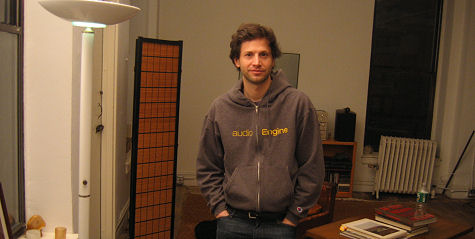
Capote director Bennett Miller — 12.22.05, 5:20 pm
And so I didn’t get into Capote‘s primary year-end issues, which, if you ask me, are (a) a strange deficiency of Best Picture heat and (b) a profoundly agonizing Best Actor stand-off happening right now between Capote‘s Phillip Seymour Hoffman and Brokeback Mountain‘s Heath Ledger.
Why would a guest want to bring up a couple of vaguely bothersome issues to his nice-guy host?
It’s not like the movie is anything but a solid success. But more moviegoers should see it, and Oscar approvals are one way of bringing this about. For this to happen the hard fact is that Capote needs to re-ignite a bit. Okay, so it’s bothersome to say this and I’m sorry…but the game is the game is the game.
Miller, 38, is a relaxed, friendly, quietly reflective sort who’s into listening as much as making himself heard, which right away sets him apart from a lot of filmmakers I’ve run into. And he lives in a spacious, sparsely furnished sixth-floor loft on Lafay- ette Street that feels instantly soothing to walk into.
The moment I did this I succumbed. I said to myself, “Drop it…it’s the late after- noon and it’s cold outside and it’s almost Christmas…forget the hardball and go with the layback.”
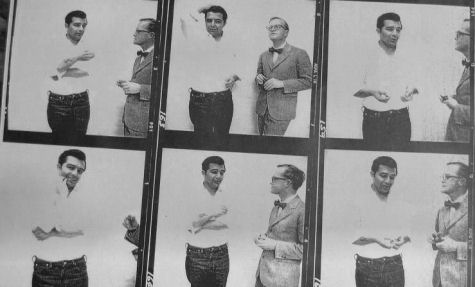
Clutter-family killer Perry Smith (l., white shirt) and Truman Capote (r., glasses and jacket) during Richard Avedon photo session sometime in early 1960
And then about halfway into our talk Miller brought out some copies of Richard Avedon’s contact sheets from that 1960 photo session he did with Truman Capote and Clutter-family slayers Perry Smith and Dick Hickock. Amazing images, all.
The photo session is recreated in Capote, of course, and my first reaction to the Real McCoys was frankly one of surprise. The actual Smith seems much more relaxed and even jovial than the way Clifton Collins, Jr. played him in the film. Much less pensive and guarded.
Mark Pellegrino was a fairly good physical choice to play Hickock in Miller’s film, I suppose, but In Cold Blood director Richard Brooks was, I now realize, being kind to Hickock’s legacy by hiring Scott Wilson to play him in that 1967 film. Look at those strangely slanted eyes. That scowl. That crammed-together, misshapen face (a result of a car accident).
Miller showed me these photos when I mentioned I’d never seen them published anywhere except for a couple of straight-on portrait shots of the killers in an old Life magazine.
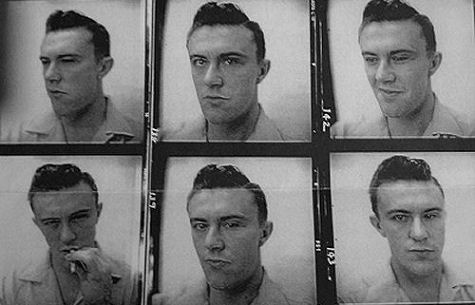
The real Richard Hickock, also by Avedon
We talked mostly about the things I’ve always loved about Capote apart from Hoffman’s transcendent performance and the general “all” of it.
Particularly Adam Kimmel’s extraordinary widescreen cinematography, and the suggestions of Andrew Wyeth’s landscapes in the Holcomb, Kansas, portions early on.
And Mychael Danna’s music, which I didn’t really get into until I clicked on the Capote website and started listening to a certain loop from the soundtrack over and over again.
Plus we talked a little bit about technical issues and what the real Holcomb, Kansas, has turned into, and when Miller knew he had gotten it right, and what he and Hoffman might be doing in the future, etc.
A good portion of our chat is here in these installments — part #1 and part #2
If I’d been into stirring the pot, I would have wondered aloud why Capote hasn’t caught any serious Best Picture action thus far. This really should have happened, and I’ve been scratching my head about it for the last couple of months.
It wasn’t that long ago that this exquisitely composed Louis Malle film with a fascinating under-vibe (partly about dread and horror, and partly about deep-down fragile emotion) was all but smothered in praise, starting with its early September debut at the Telluride Film Festival.
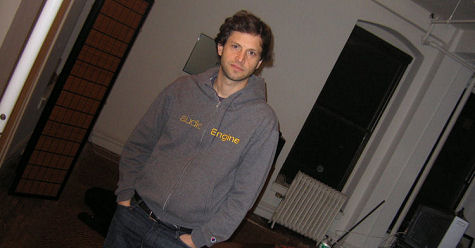
12.22.05, 5:23 pm
And there’s no missing the fact that it’s currently the third highest-rated film on the thrown-together Movie City News critics’ ten-best list (behind Good Night, and Good Luck and Brokeback Mountain).
I also would have brought up what I wrote a day or two ago in WIRED, which is that Hoffman was the presumptive Best Actor winner from late August to roughly mid-to-late November until Ledger began surging two or three weeks ago, and how I’m torn by these two performances…torn and divided…and so is everyone else.
It’s going to hurt a little bit no matter which one wins, so let’s hope for a replay of the 1968 Best Actress contest that resulted in a tie when The Lion in Winter‘s Katharine Hepburn and Funny Girl‘s Barbra Streisand both took home trophies.
That would be perfect…that would be really nice. And by suggesting this I feel like I’ve gotten myself off the hook a bit.
I haven’t explained what I meant by calling this article “Miller’s Crossing,” and I guess it’s because last year he was mainly the guy who directed that very cool doc called The Cruise five or six years ago, and post-Capote he’s earned passage into a very high-end realm that few directors have known or enjoyed…and the sky’s the limit from here on.
Grabs
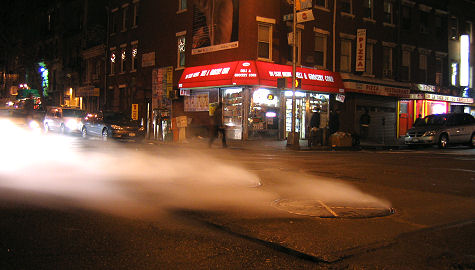
Sooner or later, all New York-based still photographers wind up taking a Martin Scorsese/Taxi Driver steam-seeping-out-of-the-pavement shot
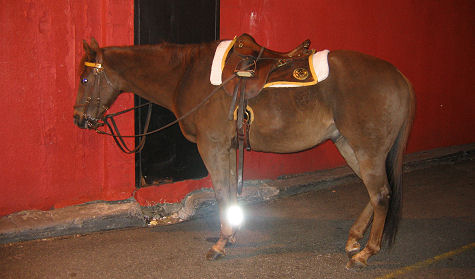
One of New York’s finest relaxing in a blacktop parking lot area off Eighth Avenue — Friday, 12.23, 8:40 pm
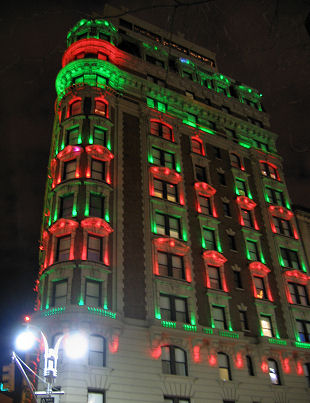
Broadway and 54th Street
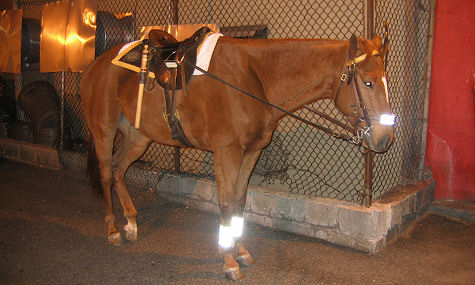
Ditto
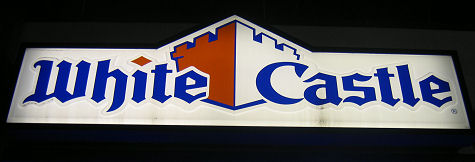
Naturalism
“While reading your impressions of The New World I kept feeling a vague sensation of deja-vu….as if thinking of a forgotten Mallick- like film. Well, it was no Malick film at all. It was Tarkovsky’s Solaris.
“The earthbound parts of Tarkovsky’s film have a deep preoccupation with the natural world, in the same apparent vein of how you described Malick’s World view. Criterion has a beautiful DVD of Solaris, with an engrossing commentary track. If you have the time, be sure to check it out. It moves slowly…but it’s really beautiful and poignant.
“I never saw the Soderbergh re-make, by the way, and it breaks my heart to say I haven’t seen the The New World either, especially since chances of it playing in Nicaragua are slim-to-none!” — Juan Carlos Ampie, resident of an unnamed city in Nicaragua.
Playing in Worcester
“I’ve been doing my damndest to catch up with all the so-called Oscar contenders, Brokeback Mountain last Tuesday and Munich and Memoirs of a Geisha yesterday…and there’s no question as to which one stood tallest.
“Brokeback‘s emotional residue stuck to me like super glue for the better part of two days. I haven’t felt a movie invade me like that since…I don’t know if you saw The Best of Youth, but it had that kind of emotional pull too, at least for me.
“I remember a column you wrote about “sad-in-a-great-way movies vs. just-plain-downer movies,” and Brokeback fits that former category in ways I’m still evaluating. I love that Anthony Lane comapred its elegiac tone to that of The Last Picture Show, both movies being about dying that slow death of the soul.
“I love Brokeback Mountain so much I don’t even want to dwell on potential nitpicking about how Ang Lee’s makeup crew wasn’t exacting about the passage of 20 years. When a movie spears your heart like this one does, who gives a crap?
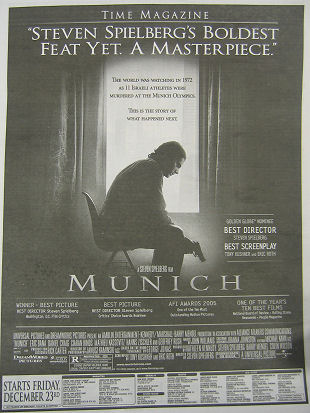
“And I have lost all respect for Time‘s Richard Corliss and Richard Schickel — the former listing a coffee table movie like Geisha among his top ten, the other going for Munich, and yet neither getting the granite timelessness of Brokeback Mountain. Those two boys need to be put out to pasture like the sheep.
“And I know exactly what you’re going through in your sentiments about Hoffman vs. Ledger. I’d also love to see a replay of the 1968 Oscars, when Katherine Hepburn and Barabra Streisand tied for Best Actress.
“As for Munich…oy! There are marvelous things in it, and considering what I’ve read it’s not nearly as overtly polemic as I feared it might be. Some of the set pieces are amazingly tense and beautifully rendered, and the acting is first rate, but you can see where Spielberg is straining not to strain, if that makes sense.
“He’s trying mightily hard to avoid his usual cinematic ticks and deliver a message-laden French Connection meets The Day of the Jackal. And John Williams can’t avoid inserting the lugubrious female wailing voice during the opening credits to remind us this is a somber film with somber issues, in an otherwise fairly restrained musical score.
“Munich, in short, is nowhere near as resonant as Brokeback or Capote, which is mainly riding on the strength of Hoffman’s amazing performance even though it has a wonderfully somber gravity that doesn’t have to depend on manipulation to pull us in. I wish more people would realize just how great the FILM is on its own.
“I won’t waste more than a sentence or two on Geisha, which is a meretricious, vacuous waste of Arthur Golden’s finely detailed novel. Even the cat fight between Gong Li and Ziyi Zhang didn’t do it for me.” — Paul Kolas , Worcester, Mass.
And Atlanta…
“I saw Brokeback Mountain at the 4:40 pm showing Thursday in Atlanta…you know, the “south”? GW country? My ass.
“Three-quarters full, Jeff. And mostly heterosexual couples. And when it was over, we all spilled out, dazed, into the lobby where the sold-out line for the 7:30 showing awaited…looking at our faces for a clue.
“The film is revolutionary because it really is a basic, haunting and captivating love story…with the protagonists just happening to be men. They go through the same joy, passion, heartache, frustrations and excitements as all lovers do. They end up with others they try to love since they can’t be together and love each other the way they actually need to…as all overs do.
“When films are this good — not one wasted shot in this movie — then they all need to be this good.
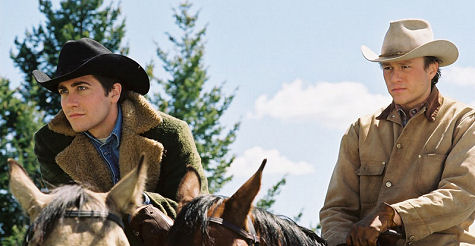
“Why hasn’t Linda Cardinelli been given more praise? Though a third-act character, she was totally memorable, and as good to me as Michelle Williams, who has some startling, riveting moments. Anne Hathaway, also…the last conversation she has with Ennis on the phone? She lets us see that she knows, and that she loves her husband anyway.
“Gyllenhal deserves to be nominated for Best Supporting Actor(make a case for it, Jeffrey) for his scene in the car driving home after being rebuffed by Ledger’s Ennis. His eyes are soulful in this, and I was thrilled with the gravity of this performance — real weight there. He was the heart of the picture for me, and made me feel the love between the men.
“Philip Seymour Hoffman has been my guy all year…until now. Sorry, Jeff. Hoffman is brilliant, but I never felt for his Capote what I felt for Heath Ledger’s Ennis del Mar.
“You could point out dozens of special Brokeback moments, big and small, but I have two that still I can’t shake. The first time the guys see each other after four years…that’s all Heath Ledger. It is in his performance that I felt the HEAT of these men — the strong sexual connection, like they fill each other’s souls UP, you know?
“And of course, the extended last scene with his daughter, then the final money shot…still in the pit of my gut…but I loved the scene where he discovers the shirts. I FELT his longing, his missing his soul mate. An stonishing, astounding performance. Who saw it coming?
“I hope to love Munich, but I doubt I’ll love anything as much as I loved this. I think I’ll see it again this weekend in Tallahassee.” — Roderick Durham
